American pragmatism is a philosophy from which the Center for Democratic Culture derives its inspiration, which informs its research practice and guides its civic initiatives. The pragma cyberlibrary housed on this page highlights the works and political engagement of intellectuals who have helped advance pragmatist ideas in recent decades. Featured below are interviews, autobiographical materials, and some of the key studies representing diverse currents in contemporary pragmatism. Where possible, we provide links to relevant texts or offer samples of larger volumes. Our hope is that this selection will help the internet-bound generation understand the pragmatist project, demonstrate its relevance for our time, illuminate the role of pragmatists as public intellectuals, and encourage readers to explore pragmatist ideas in their contemporary application. More online resources can be found in the Intercyberlibrary featuring works of sociologists schooled in the pragmatist tradition and the International Biography Initiative section of the CDC web site.
| George Herbert Mead |
Correspondence |
Mead Letters, July 19 - November 15, 1883
Mead Letters, September 14 - November 15, 1883
Mead Letters, Febrauary 23 - March 16, 1884
Mead Letters, April 6 - June 10, 1884
Mead Letters, July 18 - August 16, 1884
Mead Letters, September 14 - December 14, 1884
Mead Letters, January 31 - March 31, 1895
|
Mead Letters, July 16 - November 30, 1895
Mead Letters, Febrauary 28 - March 28, 1896
Mead Letters, April 11 - May 16, 1896
Mead Letters, June 6 - October 28, 1896
Mead Letters, April 3 - May 6, 1897
Mead Letters, May 7 - August 28, 1897
Mead Letters, August 31 - December 26, 1897
|
| Publications |
“The Relation of Art to Morality,” Oberlin Review 9, (1881): 63-64.
“Charles Lamb,” Oberlin Review 10, (1882-3): 15-16.
“De Quincy,” Oberlin Review 10, (1882-3): 50-52.
“John Locke,” Oberlin Review 10 (1882-3): 217-19.
“Republican Persecution,” The Nation 39 (1884): 519-20.
“The Problem of Psychological Measurement (Abstract of a paper read to the second annual meeting of the American Psychological Association).” Proceedings of the American Psychological Association New York: MacMillan (1894): 22-23.
“The Greek Mysteries.” An abstract of a paper presented to the Philosophical Society of the University of Michigan in January 1894. University of Michigan, University Record 3 (1894): 102.
Herr Lasswitz on Energy and Epistemology,” Psychological Review 1 (1894): 172-5.
“Review of Die Moderne Energetik in ihrer Bedeutung für die Erkenntniskritik by K. Lasswitz,” Psychological Review 1 (1894): 210-3.
“Review of An introduction to Comparative Psychology by C.L. Morgan,” Psychological Review 2 (1895): 399-402.
“A Theory of Emotions from the Physiological Standpoint” (Abstract of a paper read to the third annual meeting of the American Psychological Association, 1894), Psychological Review (1895): 162-164.
“The Relation of Play to Education,” University of Chicago Record 1 (1896): 140-5.
“Review of Untersuchungen zur Phenomenologie und Ontologie des menschlichen Geistes by G. Class,” American Journal of Theology 1 (1897): 789-92.
“The Child and His Environment,” Transactions of the Illinois Society for Child-Study 3 (1897): 1-11.
“The Working Hypothesis in Social Reform,” American Journal of Sociology 5 (1899): 367-71.
“Review of 'The Psychology of Socialism' by G. Le Bon,” American Journal of Sociology 5 (1899): 404-12.
“Suggestions Towards a Theory of the Philosophical Disciplines,” Philosophical Review 9 (1900): 1-17.
“Review of Philosophie des Geldes by G. Simmel,” Journal of Political Economy 9, (1900-1): 616-9.
“A New Criticism of Hegelianism: Is It Valid?”, American Journal of Theology 5 (1901): 87-96.
“The Definition of the Psychical,” Decennial Publications of the University of Chicago, First Series, Vol. III Chicago: University of Chicago (1903): 77-112.
“The Basis for a Parents' Association,” Elementary School Teacher 4 (1903-4): 375-91.
“Image or Sensation,” Journal of Philosophy, Psychology and Scientific Method 1 (1904): 604-7.
“The Relation of Psychology and Philology,” Psychological Bulletin 1 (1904): 375-91.
“Review of Du röle de l'individu dans le déterminisme social and Le probleme du déterminisme, déterminisme biologique et déterminisme social by D. Draghiscesco,” Psychological Bulletin 2 (1905): 399-405.
“Review of Études sur la selection chez l'homme by Paul Jacoby,” Psychological Bulletin 2 (1905): 407-12.
“Science in the High School,” School Review 14, (1906): 237-49
“The Imagination in Wundt's Treatment of Myth and Religion,” Psychological Bulletin 3,(1906): 393-9.
“The Teaching of Science in College,” Science 24 (1906): 390-7.
“Concerning Animal Perception,” Psychological Review 14, (1907): 383-90.
“Editorial Notes: School System in Chicago,” School Review 15 (1907): 160-5.
“Review of The Newer Ideals of Peace by Jane Addams,” American Journal of Sociology 13, (1907): 121-8.
“Review of L'Evolution créatrice by Henri Bergson,” Psychological Bulletin 4 (1907): 379-84.
“The Relation of Imitation to the Theory of Animal Perception,” (Abstract of a paper read to the fifteenth annual meeting of the American Psychological Association, 1906) , Psychological Bulletin 4 (1907): 210-211.
“The Educational Situation in the Chicago Public Schools,” City Club Bulletin 1 (1907-8): 131-8.
“Educational Aspects of Trade Schools,” Union Labor Advocate 8 (1908): 19-20.
“The Philosophical Basis of Ethics,” Internation”al Journal of Ethics 18 (1908): 311-23.
“The Social Settlement, Its Basis and Function, University of Chicago Record 12 (1907-8): 108-10.
“McDougall's Social Psychology,” Psychological Bulletin 5 (1908): 385-391.
“Review of L'Ideal moderne by Paul Gaultier,” Psychological Bulletin 5 (1908): 403-4.
“Editorial Notes: Policy Statement of the Elementary School Teacher,” Elementary School Teacher 8, (1907-8): 281-4.
“Editorial Notes: Industrial Education and Trade Schools,” Elementary School Teacher 8 (1907-8): 402-6.
“Editorial Notes: Resolution on Industrial Training,” Elementary School Teacher 9 (1908-9): 156-7.
“Industrial Education, the Working-Man, and the School,” Elementary School Teacher 9 (1908-9): 369-83.
“Editorial Notes: Moral Training in the Schools,” Elementary School Teacher 9 (1908-9): 327-8.
“Editorial Notes: The Problem of History in Elementary School,” Elementary School Teacher 9 (1908-9): 433-434.
“Social Psychology as Counterpart to Physiological Psychology,” Psychological Bulletin 6 (1909): 401-408.
“The Adjustment of Our Industry to Surplus and Unskilled Labor,” Proceedings of the National Conference of Charities and Corrections 34 (1909): 222-225.
“Social Consciousness and the Consciousness of Meaning,” Psychological Bulletin 7 (1910): 397-405.
“The Psychology of Social Consciousness Implied in Instruction,” Science 31 (1910): 688-93.
“What Social Objects does Psychology Presuppose,” (Abstract of a paper read to the eighteenth annual meeting of the American Psychological Association, 1909), Psychological Bulletin 7 (1910): 52-3.
“What Social Objects Must Psychology Presuppose?,” Journal of Philosophy, Psychology and Scientific Methods 7, (1910): 174-80.
“[Entry for] Mead, Prof. G. H..” American Men of Science (Second Edition). New York: Science Press (1910): p. 315.
“Review of Social Value, A Study in Economic Theory by B. M. Anderson Jr.,” Psychological Bulletin 8 (1911): 432-6.
“Review of Individualism: Four lectures on the Significance of Consciousness for Social Relations by W. Fite,” Psychological Bulletin 8 (1911): 323-8.
“The Mechanism of Social Consciousness,” Journal of Philosophy, Psychology and Scientific Methods 9, (1912): 401-6.
A Report on Vocational Training in Chicago and in other Cities: an analysis of the need for industrial and commercial training in Chicago, a study of present provisions therefore in comparison with such provisions in twenty-nine other cities, together with recommendations as to the best form in which such training may be given in the public school system of Chicago, coauthor with Ernest A. Wreidt and William J. Bogan . Chicago: City Club of Chicago (1912).
“A Report of the Public Education Committee of the City Club of Chicago upon Issues involved in the proposed legislation for Vocational Education In Illinois containing also a Suggested Draft of A Bill and A Statement and some Discussion of Underlying Principles,” City Club Bulletin 5, (1912): 373-383.
“Exhibit of the City Club Committee on Public Education,” City Club Bulletin 5(1912): 9.
“Probation and Politics,” Survey 27, (1912): 2004-2014. It is probable, but not certain that Mead was the author of this essay.
“Remarks on Labor Night Concerning Participation of Representatives of Labor in the City Club,” City Club Bulletin 5 (1912): 214-5.
“The Social Self,” Journal of Philosophy, Psychology and Scientific Methods 10 (1913): 374-380.
“A Heckling School Board and an Educational Stateswoman,” Survey 31 (1914): 443-4.
“Natural Rights and the Theory of the Political Institution,” Journal of Philosophy 12 (1915): 141-155.
“Constitutional and Political Guarantees,” Philosophical Review 24 (1915): 193-194 Summary by W. F. Dodd.
“The Psychological Bases of Internationalism,” Survey 33 (1915): 604-7.
“The Larger Educational Bearings of Vocational Guidance ", in: Meyer Bloomfield (ed.), Readings in Vocational Guidance (Boston 1915): 43-55.
“Madison: The passage of the University of Wisconsin through the state political agitation of 1914; the survey by William H. Allen and his staff and the legislative fight of 1915, with the indications these offer of the place the state university holds in the community,” Survey 35 (1915): 349-51, 354-61.
“A Rejoinder,” Survey 35 (1915): 607, 610.
“Professor Hoxie and the Community,” University of Chicago Magazine 9 (1916-7): 114-117.
“The Conscientious Objector,” National Security League, Patriotism through Education Series, Pamphlet No. 33. New York, 1917.
“Germany's Crisis - Its Effect on Labor, Part I,” Chicago Herald July 26, 1917.
“War Issues to U. S. Forced by Kaiser,” Chicago Herald August 2, 1917.
“America's Ideals and the War,” Chicago Herald August 3, 1917.
“Democracy's Issues in the World War,” Chicago Herald August 4, 1917.
“Josiah Royce - A Personal Impression,” International Journal of Ethics 27 (1917): 168-70.
“Scientific Method and Individual Thinker,” in: John Dewey et al. (eds), Creative Intelligence: Essays in the Pragmatic Attitude New York: Henry Holt and Co. (1917): 176-227.
“Review of Truancy and Non-Attendance in the Chicago Schools by Edith Abbott and Sophonisba P. Breckinridge,” Survey 38 (1917): 369-70.
“The Psychology of Punitive Justice,” American Journal of Sociology 23 (1918): 577-602.
“Review of The Nature of Peace and the Terms of Its Perpetuation by Thorsten Veblen,” Journal of Political Economy 26 (1918): 752-62.
“Social Work, Standards of Living and the War” Proceedings of the National Conference of Social Work 45 (1918): 637-644.
“The League and the Community.” Bulletin of the Vocational Supervision League, April 15, 1919, I.
“A Translation of Wundt's 'Folk Psychology'”, American Journal of Theology 23 (1919): 533-36.
“Retiring President's Address,” City Club Bulletin 13 (1920): 94-95.
“Idea,” in Shailer Mathews and Gerald Birney Smith (eds), A Dictionary of Religion and Ethics (New York 1921): 215-216.
“Ideal,” in Shailer Mathews and Gerald Birney Smith (eds), A Dictionary of Religion and Ethics (New York 1921): 216.
“Individualism,” in Shailer Mathews and Gerald Birney Smith (eds), A Dictionary of Religion and Ethics (New York 1921): 222.
“Infinity,” in Shailer Mathews and Gerald Birney Smith (eds), A Dictionary of Religion and Ethics (New York 1921): 223.
“Law of Nature, Natural Law,” in Shailer Mathews and Gerald Birney Smith (eds), A Dictionary of Religion and Ethics (New York 1921): 254-255.
“A Behavioristic Account of the Significant Symbol,” Journal of Philosophy 19 (1922), pp. 157-63.
“Scientific Method and the Moral Sciences,” International Journal of Ethics 33 (1923), pp. 229-47.
“Review of The Domain of Natural Science by E.W. Hobson,” Journal of Religion 4 (1924), pp. 324-7.
“The Genesis of the Self and Social Control,” International Journal of Ethics 35 (1925), pp. 251-77.
“The Nature of Aesthetic Experience,” International Journal of Ethics 36 (1926), pp. 382-92.
“The Objective Reality of Perspectives,” in: E. S. Brightman (ed.), Proceedings of the Sixth International Congress of Philosophy (New York 1926), pp. 75-85.
“A Pragmatic Theory of Truth,” “Studies in the Nature of Truth” University of California Publications in Philosophy 11 (1929), pp. 65-88.
“Bishop Berkeley and his Message,” Journal of Philosophy 26 (1929), pp. 421-430.
“National-Mindedness and International-Mindedness,” International Journal of Ethics 39 (1929), pp. 385-407.
“The Nature of the Past,” in John Coss (ed.), Essays in Honor of John Dewey New York: Henry Holt & Co. (1929), pp. 235-42.
“Cooley's Contribution to American Social Thought,” American Journal of Sociology 35 (1930), pp. 693-706.
“Philanthropy from the Point of View of Ethics,” in E. Faris, F. Laune and A. J. Todd (eds), Intelligent Philanthropy (Chicago 1930), pp. 133-48.
“The Philosophies of Royce, James, and Dewey in Their American Setting,” International Journal of Ethics 40 (1930), pp. 211-31.
“Dr. A. W. Moore"s Philosophy,” University of Chicago Record, New Series, 17 (1931), pp. 47-9.
The Philosophy of the Present. Edited by Arthur E. Murphy. Open Court: La Salle (Illinois) 1932. (This volume contains the following essays in its appendix: Empirical Realism, pp. 93-118; The Physical Thing, pp. 119-39; Scientific Objects and Experience, pp. 140-60; and nos 84 and 86 of this bibliography).
Mind, Self, and Society from the Perspective of a Social Behaviorist, Edited by Charles W. Morris. Chicago: University of Chicago (1934).
“The Philosophy of John Dewey,” International Journal of Ethics 46 (1936), pp. 64-81.
Movements of Thought in the Nineteenth Century, Edited by Merritt H. Moore. University of Chicago: Chicago (1936).
The Philosophy of the Act, Edited by Charles W. Morris et al. University of Chicago: Chicago (1938).
“How can a sense of citizenship be secured?” Mead papers, (date unknown): 1-11.
“Emotion and Instinct" Mead papers, (date unknown): 1-3.
“The Problem of Comparative Psychology,” Mead papers, (date unknown): 1-16a.
“The Social Character of Instinct,” Mead papers, (date unknown): 1-5.
“The University and the School of Education,” Mead papers, (date unknown): 1-6.
“On the Influence of Darwin's Origin of Species.” Unpublished manuscript (circa 1909?). 17 pages.
“Social Bearings of Industrial Education,” Mead papers, (date unknown): 1-24.
|
| Pragmacyberlibrary |
|
|
B. Antonio, Karl Marx
B. Antonio, For Social Theory: Alvin Gouldner's Last Project and Beyond
B. Antonio, Marx and Modernity: Key Reading and Commentary
B. Antonio, Nietzsche: Social Theory and the Twilight of the Millenium
B. Antonio, Modernity and Social Theory: The Limits of the Postmodernist Critique
B. Antonio, After Postmodernism: Reactionary Tribalism
B. Antonio, Nietzsche's Antisociology: Subjectified Culture and the End of History
B. Antonio, Postmodern Storytelling versus Pragmatic Truth-Seeking: The Discursive Bases of Social Theory
B. Antonio, The Normative Foundations of Emancipatory Theory: Evolutionary Versus Pragmatic Perspectives
B. Antonio, Immanent Critique as the Core of Critical Theory
B. Antonio, The Contradiction of Domination and Production in Bureaucracy
B. Antonio, The Processual Dimension of Degradation Ceremonies: The Chicago Conspiracy Trial: Success or Failure?
B. Antonio, The Specter of Democracy: A Review
B. Antonio, Periodizing Globalization: From Cold War Modernization to the Bush Doctrine
B. Antonio, Publications
|
|
V. Colapietro, Practivce, Agency, and Sociality
V. Colapietro, The Pragmatic Turn
V. Colapietro, Toward a Truly Pragmatic Theory of Signs
V. Colapietro, Peirce's Rhetorical Turn
V. Colapietro, Engaged Pluralism
V. Colapietro, Entangling Alliances and Critical Traditions
V. Colapietro, Further Consequences of a Singular Capacity
V. Colapietro, Immediacy, Opposition, and Mediation
V. Colapietro, Portrait of an Historicist
V. Colapietro, Toward a Pragmatic Conception of Practical Identity
V. Colapietro, Pragmatism and Psychoanalysis
V. Colapietro, The Space of Signs: C.S Peirce's critique of Psychologism
V. Colapietro, Purpose, Power, and Agency
V. Colapietro, Striving to Speak in a Human Voice
V. Colapietro, Subject Position and Positional Subjectivity
V. Colapietro, Conjectures Concerning Uncertain Qualities Claimed for Humans
V. Colapietro, Testing Our Institutions
V. Colapietro, Bibop as Historical Actuality
V. Colapietro, Peirce's Approach to the Self: An Introduction
V. Colapietro, Recalling Camus Today
|
D. Franks, Mind
D. Franks, Emotions
D. Franks, The Pursuit of Happiness (with Susan Heffernan)
D. Franks, Sociology and the Real World (with Stephen Lyng)
D. Franks, Oscar and All the Stars on the Range
D. Franks, Toward a Transactional Typology of Action
D. Franks, Transaction and a Sociological Method for Social Problems
D. Franks, Mutual Interests, Different Lenses: Current Neuroscience and Symbolic Interaction
D. Franks, Mind, Brain, and Society: Toward a Neurosociology of Emotions (with Thomas Smith)
D. Franks, Social Perspectives on Emotions. A Research Annual 1992 (with Viktor Gekas)
D. Franks, The Sociology of Emotions: Original Essays and Research Papers (wih E. Doyle McCarthy)
D. Franks, The Sociology of Emotoins: An Annotated Bibliography (wtih B. Curthbertson-Johnson)
D. Franks, Differential Exposure to Courses in Two Majors and Differences in Students'... (with R. Falk and J. Hinton)
D. Franks, Review: Commercialization of Intimate Life: Notes From Home and Work
D. Franks, Review: The Social Construction of Emotions
|
G. Halton, Pragmatism
G. Halton, The Cultic Roots of Culture
G. Halton, Peircean Animism and the End of Civilization
G. Halton, Meaning and Modernity: Preface
G. Halton, The Living Gesture and the Signifying Moment
G. Halton, Bereft of Reason: An Introduction
G. Halton, Mead Market or Slaughterhouse?
G. Halton, Eden Inverted: On the Wild Self and the Contraction of Consciousness
G. Halton, Why Pragmatism Now?
G. Halton, Eden Inverted: On the Wild Self and the Contraction of Consciousness
G. Halton, Kitsch Me if You Can, Doughboy
G. Halton, Review: Jurgen Habermas's Theory of Communicative Etherealization
G. Halton, Review: The Real Relation between Pragmatism and Chicago Sociology
G. Halton, The Home Front
G. Halton, Passionate Corpse
G. Halton, Ruminations from My Trip to Warsaw and Berlin
G. Halton, The Passion of the Living-Dead: Terry Schiavo
G. Halton, The Semiautomatic Weapon as Text
G. Halton, Off the Wall Blues Band Selections
G. Halton, Publications
|
|
|
H. Joas, Pragmatism and Social Theory
H. Joas, Pragmatism and Social Theory: An Introduction
H. Joas, The Unhappy Marriage of Hermeneutics and Functionalism
H. Joas, The Creativity of Action
H. Joas, The Creativity of Action: An Introduction
H. Joas, The Creativity of Action: Pragmatism and the Critique of the Rational Action Model
H. Joas, War and Modernity
H. Joas, G. H. Mead and Contemporary Examination of His Thought
H. Joas, The Inspiration of Pragmatism: Some Personal Remarks
H. Joas, The Autonomy of the Self
H. Joas, The Gift of Life: The Sociology of Religion in Talcott Parsons' Late Work
H. Joas, Creativity and Society (with Erkki Kilpinen)
H. Joas, Combining Value Pluralism and Moral Universalism: Isaiah Berlin
H. Joas, Max Weber and the Origin of Human Rights: A Study of Cultural Innovation
H. Joas, Publications
|
|
|
|
M. Nassbaum, Hiding from Humanity. Disgust, Shame, and the Law: An Introduction
M. Nussbaum, The Enduring Significance of John Rawls
M. Nussbaum, Tragedy and Justice: Bernard Williams Remembered
M. Nussbaum, Manliness from a Femal Point of View
M. Nussbaum, In a Lonely Place
M. Nussbaum, Epistemology of the Closet
M. Nussbaum, The Professor of Parody
M. Nussbaum, Can Patriotism Be Compassionate?
M. Nussbaum, Danger to Human Dignity: the Revival of Disgust and Shame in the Law
M. Nassbaum, Liberal Education and Global Community
M. Nussbaum, Publications
|
R. Posner, Community, Wealth, and Equality
R. Posner, Orwell Versus Huxley: Economics, Technology, Privacy, and Satire
R. Posner, An Economic Approach to the Law of Evidence
R. Posner, Agency Models in Law and Economics
R. Posner, Smooth Sailing: Democracy Does Not Need Deliberation Day
R. Posner, Our Domestic Intelligence Crisis
R. Posner, The Cost of the War in Iraq
R. Posner, Bad News
|
|
R. Rorty, Trotsky and the Wild Orchids
R. Rorty, Consequences of Pragmatism: An Introduction
R. Rorty, Contingency, Irony, and Solidarity: An Introduction
R. Rorty, Philosophy and Social Hope: An Introduction
R. Rorty, Philosophical Convictions
R. Rorty, Analytic Philosophy and Transformative Philosophy
R. Rorty, A Pragmatist View of Contemporary Analytic Philosophy
R. Rorty, Moral Universalism and Economic Triage
R. Rorty, Is Everyting Relative? A Debate on the Unity of Knowledge
R. Rorty, Unger, Castoriadis, and the Romance of a Natoonal Future
R. Rorty, The Demonization of Multiculturalism
R. Rorty, Is This the End of Democracy?
R. Rorty, To the Sunlit Uplands
R. Rorty, Men and Utopias
R. Rorty, Publications
|
D. Shalin, Pragmatism and Democracy: Studies in History, Social Theory and Progressive Politics
D. Shalin, The Hermeneutics of Prejudice: Heidegger and Gadamer in Their Historical Setting
D. Shalin, Pragmatism and Social Interactionism
D. Shalin, Critical Theory and the Pragmatist Challenge
D. Shalin, Modernity, Postmodernism, and Pragmatist Inquiry
D. Shalin, G. H. Mead, Socialism, and the Progressive Agenda
D. Shalin, Liberalism, Affect Control, and Emotionally Intelligent Democracy
D. Shalin, Legal Pragmatism, an Ideal Speech Situation, and the Fully Embodied Democratic Process
D. Shalin, The Pragmatic Origins of Symbolic Interactionism and the Crisis of Classical Science
D. Shalin, Romanticism and the Rise of Sociological Hermeneutics
D. Shalin, Signing in the Flesh: Notes on Pragmatist Hermeneutics
D. Shalin, Barack Obama and the Promise of Liberal Pragmatism
D. Shalin, Democracy in the Hands of the People
D. Shalin, "Amerika" - an Uncertain Trumpet
D. Shalin, All U.N. Edicts Are Not Created Equal
D. Shalin, Emotional Barriers to Democracy Are Daunting
D. Shalin, Glasnost and Sex
D. Shalin, Ethics of Survival
D. Shalin, Settling Old Accounts
D. Shalin, The Promised Land
D. Shalin, Vladimir Putin's KGB Capitalism
D. Shalin, Lost Cause, Bound for Exile
D. Shalin, Publications
|
R. Shusterman, The Range of Pragmatism: An Introduction
R. Shusterman, Practicing Philosophy
R. Shusterman, The End of Aesthetic Experience
R. Shusterman, Dewey on Experience: Foundation or Reconstruction?
R. Shusterman, The Range of Pragmatism: An Introduction
R. Shusterman, Moving Truth: Affect and Authenticity in Country Musicals
R. Shusterman, The Silent, Limping Body of Philosophy
R. Shusterman, Somaesthetics: A Disciplinary Proposal
R. Shusterman, Aesthetic and Practical Interests and their Bodily Ground
R. Shusterman, Somatoaestetics and Care of the Self: The Case of Foucault
R. Shusterman, Essay on Foucault: The Self as a Work of Art
R. Shusterman, Pierre Bourdieu: Reason and Passion
R. Shusterman, Putnam and Cavell on the Ethics of Democracy
R. Shusterman, Mind-Body Problems
R. Shusterman, Metaphysics in the Megabookstore
R. Shusterman, Pragmatism and Liberalism between Dewey and Rorty
R. Shusterman, France's Philosophe Impolitique
R. Shusterman, Publications
|
|
R. Westbrook, Anti-Intellectualism in American Life Revisited
R. Westbrook, Creative Democracy - The Task Before Us
R. Westbrook, Democratic Hope - Response to My Critics
R. Westbrook, How Democratic Were the Progressives: Ideas and Images
R. Westbrook, Bourne Over Baghdad
R. Westbrook, Randolph Bourne's America
R. Westbrook, Pictures without Publics: Photography and Politics in the Sixties
R. Westbrook, The Responsibility of Presidents: Remembering Harry Truman
and the Atomic Bomb
R. Westbrook, World War II and the
Social History of the American Moral Imagination
R. Westbrook, Torturing the Conventions
R. Westbrook, Ebony and Ivory
R. Westbrook, Entrepreneurial University
R. Westbrook, You Can't Always Get What You Want, But If You Try Sometimes...
R. Westbrook, 2000 Commencement Address
R. Westbrook, Howard Coles: Rochester Radical
R. Westbrook, Publications
|
N. Wiley, Bureaucracy as Class Domination: Weber vs. Critical Theory
N. Wiley, The Chicago School and Democracy: An Elective Affinity Analysis, 2009
N. Wiley, Pragmatist Theory of the Self
N. Wiley, Pragmatism and the Dialogical Self
N. Wiley, Peirce and the Founding of American Sociology
N. Wiley, Bakhtin's Voices and Cooley's Looking Glass Self
N. Wiley, The Self as Self-Fulfilling Prophecy
N. Wiley, Emotion and Film Theory
N. Wiley, Inner Speech as a Language: a Saussurean Inquiry
N. Wiley, Inner Speech and Agency
N. Wiley, Pragmatism and American Democracy: An Elective Affinity Analysis
N. Wiley, The Macro-Micro Problem in Sociological Theory
N. Wiley, Religious and Political Liberalism among Catholics
N. Wiley, America's Unique Class Politics: The Interplay of the Labor, Credit, and Commodity Markets
N. Wiley, Florian Znaniecki's Key Insight: The Merger of Pragmatism and Neo-Kantianism (html)
N. Wiley, Early American Sociology and the Polish Peasant
N. Wiley, The Convergence of Weber and Keynes
N. Wiley, Notes from the Interview with Herbert Blumer
N. Wiley, On Interpreting an Interpretation
N. Wiley, Publications
|
J. Williams, The Interaction of Courts and Legislatures in Creating a Family-Responsive Workplace
J. Williams, The New Glass Ceiling: Mothers and Fathers Sue for Discrimination (with N. Segal)
J. Williams, One Sick Child Away from Being Fired
J. Williams, Deconstructing the Maternal Wall (with E. Westfall)
J. Williams, Mothers' Dream:
Abortion and the High Price of Motherhood (with S. Shames)
J. Williams, A Half-Time Tenure-Track Proposal
(with R. Drago)
|
| Further Studies
in Pragmatism |
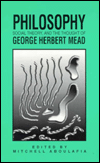
|
Aboulafia,
Mitchell (1991). Philosophy, Social Theory, and the Thought of George
Herbert Mead. Albany: State University of New York Press.
Essays assembled in this volume examine the works and life of George
Herbert Mead, pragmatist philosopher and social thinker, whose ideas
have had a profound impact on social theory in this country and
abroad. Contributors to this volume, American and continental scholars,
show the centrality of Mead’s ideas for understanding human
interaction. The discussion illuminates the dialectics of self and
society in the ongoing process of social reconstruction.
|

|
Aboulafia,
Mitchell., ed. (2002). Habermas and Pragmatism. New York: Routledge.
Jurgen Habermas is a
German philosopher seeking to blend the best of continental and
American social thought. Papers collected in this volume discuss
Habermas’s contribution to the ongoing trans-Atlantic dialogue,
focusing among other things on the philosophy of language, the nature
of democracy, the problems of rationality, and the directions in
contemporary social theory. Habermas and Pragmatism includes an
essay by Jurgen Habermas addressing some of the points raised by
his critics.
|

|
Aboulafia, Mitchell (2001). The Cosmopolitan Self. University of Illinois Press.
Mitchell Aboulafia examines the relevance of the American pragmatist philosopher George Herbert Mead to current debates on pluralism, universalism, and the fostering of a democratic temper. Addressing the relationship between Mead's notions of self and society and those of important continental thinkers, The Cosmopolitan Self demonstrates that Mead's ideas not only speak to resolving the tension between universalism and pluralism, they do so in a manner that challenges and advances the positions of these continental theoreticians.
|

|
Alexander, Thomas (1987). John Dewey's Theory of Art, Experience and Nature: The Horizons of Feeling. State University of New York Press.
This is an inquiry into the esthetic theories of John Dewey. Starting with his theory of meaning, the author makes the case that Dewey's thought on the place of art in society is pivotal for understanding his entire philosophical corpus. Alexander defends Dewey against the charges that his perspective on art derives from philosophical idealism. Dewey's notion of aesthetic experience, the author shows, is entirely consistent with his naturalistic metaphysics. The book points to the fresh vistas that pragmatist analysis brings to aesthetic theory and practice.
|
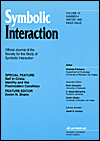
|
Antonio,
Robert. and Doug Kellner (1992). “Communication, Democratization,
and Modernity: Critical Reflections on Habermas and Dewey." Symbolic Interaction. 15:277-97.
In their wide-ranging
essay, Robert Antonio and Douglass Kellner make the case for the
continuing relevance of American pragmatism for our time, for the
project of social reconstruction and procedurally rational democracy.
Defending Dewey against the charges that his perspective on art derives from philosophical idealism, the author shows why the notion of aesthetic experience is entirely consistent with naturalistic metaphysics. The book spells out the rich and still under-explored implications of Dewey’s aesthetics for contemporary art theory and practice.
|
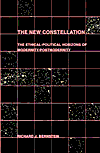
|
Bernstein,
Richard (1991). The New Constellation. Cambridge: Polity Press.
The New Constellation is a critical study in contemporary social
thought that examines the ideas of Heidegger, Derrida, Foucault,
Rorty, and Habermas. Richard Bernstein shows how these diverse thinkers
have shaped the debate about modernity and its discontents. The
book points to the numerous converges in their works and disparate
ways in which the ideas of these authors have informed the current
debate about the nature of postmodernity.
|
p

|
Bernstein, Richard (1999). Praxis and Action: Contemporary Philosophies of Human Activity. University of Pennsylvania Press.
Richard Bernstein takes up the notion of practice as a key philosophical category and shows how it has been appropriated in four modern philosophical currents – Marxism, existentialism, pragmatism, and analytic philosophy. Building on his earlier work, Bernstein argues the vitality of the pragmatist perspective on objective reality as historically emergent, socially transformed, and agent-bound.
|

|
Brint, Michael and William Weaver, eds. (1991). Pragmatism in Law and Society. New Perspectives on Law, Culture, and Society. Westview Press.
Writers hailing from law, literature, philosophy, and social science reflect on the interfaces of law and society and the meaning of pragmatic jurisprudence. Among contributors are Thomas Grey, Richard Posner, Stanley Fish, E. D. Hirsh, Richard Rorty, Lynn Baker, Cornel West, Margaret Jane Radin, Joan Williams, Hilary Putnam, Milton Fisk, Catharine Wells, Sanford Levinson, Steven Knapp, and David Hoy.
|

|
Bernstein, Richard (2002). Radical Evil: A Philosophical Interrogation. Polity Press.
According to Richard Bernstein, there can be no general theory of evil which is bound to defy our effort to grasp it in theoretical terms. Yet, we can and must grapple with evil as it confronts us in specific historical forms. Rejecting both Kant’s moral absolutism and Hegel's dialectical attempt to transcend good and evil, Bernstein finds hope in a kind of pragmatist meliorism that goads us toward civic engagement and ethical existence as sane as historical circumstances allow.
|

|
Brent, Joseph (1998). Charles Sanders Peirce: A Life. Indiana University Press.
In this first full-length biography of Peirce, Joseph Brent presents an extraordinary portrait of the Charles Sanders Peirce, a founder of American pragmatism, who devised a realist metaphysics and attempted to achieve direct knowledge of God by applying the logic of science. The author shows Peirce as a volatile, difficult man, whose achievements were not readily recognized but whose intellectual stature as one of the key figures in early pragmatism is now firmly established.
|

|
Brint, Michael and William Weaver, eds. (1991). Pragmatism in Law and Society. New Perspectives on Law, Culture, and Society. Westview Press.
Writers hailing from law, literature, philosophy, and social science reflect on the interfaces of law and society and the meaning of pragmatic jurisprudence. Among contributors are Thomas Grey, Richard Posner, Stanley Fish, E. D. Hirsh, Richard Rorty, Lynn Baker, Cornel West, Margaret Jane Radin, Joan Williams, Hilary Putnam, Milton Fisk, Catharine Wells, Sanford Levinson, Steven Knapp, and David Hoy.
|

|
Campbell, James (1992). The Community Reconstructs: The Meaning of Pragmatic Social Thought. The University of Illinois Press.
Drawing on the works of James, Dewey, Mead, and Tufts, James Campbell analyzes the contribution of pragmatist to American social thought. The discussion focuses on the community’s potential for ongoing inquiry into its foundations and its capacity for intelligent collective action the face of many challenges confronting society today.
|

|
Colapietro, M. Vincent (1989). Peirce's Approach to the Self: A Semiotic Perspective on Human Subjectivity. State University of New York Press.
Based on Peirce’s unpublished manuscripts, the author outlines Peirce’s general theory of sings and subjectivity. The book places the Peircean semiotics in its historical context, notably in its relationship to James and Saussure. The discussion extends to contemporary theorists like Eco and Kristeva and addresses current controversies surrounding the theory of sings.
|

|
Cook, Gary A. (1993). George Herbert Mead: The Making of a Social Pragmatist. Urbana and Chicago: University of Illinois Press
This is the book about the intellectual development of George Herbert Mead as a thinker of great originality and as a practitioner of social reform. Gary Cook traces the genesis of Mead’s social psychological and philosophical ideas by drawing on his less known articles that appeared during his lifetime, as well as posthumous publications.
|

|
Davaney, Sheila Greeve and Warren G. Frisina. eds. (2006). The Pragmatic Century: Conversations With Richard J. Bernstein.
State University of New York Press
A collection of interviews with Richard Bernstein where he reflects on contemporary philosophy, civic engagement, and his life and times.
|

|
Dickstein, Morris (1998). The Revival of Pragmatism: New Essays on Social Thought, Law, and Culture Duke University Press.
This collection of essays by leading philosophers, legal theorists, cultural historians and literary critics writing today explores the status of pragmatism in the late 20th century. Among the contributors are Richard Rorty, Richard Posner, Hilary Putnam, Sidney Morgenbesser, Ruth Anna Putnam, Stanley Cavell, James Kloppenberg, Robert Westbrook, Richard Bernstein, Nancy Fraser, Hans Joas, Alan Wolfe, and other scholars.
|

|
Diggins, Johan Patrick (1994). The Promise of Pragmatism: Modernism and the Crisis of Knowledge and Authority. Chicago: University of Chicago Press.
In this critique of pragmatism and neopragmatism, John Diggins traces the attempts of thinkers from William James to Richard Rorty to come to grips with the troubled legacy of modernism. The author analyzes the limitations of pragmatism from a historical perspective and asks whether America 's one original contribution to the world of philosophy has actually fulfilled its promise.
|

|
Gouinlock, James (1972). John Dewey's Philosophy of Value. New York: Humanities Press.
This book brings into focus Dewey’s philosophy of value and a naturalist ontology in which it is rooted. The author shows how Dewey’s perspective on moral inquiry can illuminate perplexing problems of philosophy, as well as aid individuals and communities grappling with everyday moral issues.
|

|
Halton,
Eugene (1995). Bereft of Reason. On the Decline of Social Thought
and Prospects for Its Renewal. Chicago: University of Chicago
Press.
Bereft of Reason makes the case that today's social theories
remain shackled to the modern myth of "the ghost in the machine."
According to Halton, most contemporary theories of rationality as
well as of antirationality, present a picture where reason appears
spectral and material world mechanical. This dichotomous view is
characteristic of modernity and represents what the author calls
"the modern error."
|
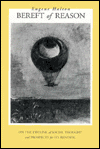
|
Halton,
Eugene (1986). Meaning and Modernity. Social Theory in Pragmatic
Attitude. Chicago: University of Chicago Press.
Drawing on the works of John Dewey, George Herbert Mead, and particularly
C.S. Peirce, Meaning and Modernity reconstructs contemporary
social theory in light of concepts derived from classical pragmatist
philosophy. The book offers a sustained critique of modern culture
in which (Rochberg-) Halton brings the radically pragmatic attitude
to bear on twentieth-century thought and its counterparts in the
expressive arts.
|
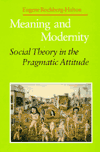
|
Hickey, Dave (1994). The Invisible Dragon: Four Essays on Beauty. Art Issues Press.
In this collection of essays on the nature, meaning, and destiny of beauty in the late 20th century, Dave Hickey reconsiders the rhetoric of beauty in Western art. The discussion touches upon Raphael, Andy Warhol, Caravaggio, and Michel Foucault. Among the book’s chief contentions is that modern art institutions need to be thoroughly democratized, with the vernacular of beauty harnessed to the cause of social change.
|

|
Hickman, Larry A (1992). John Dewey's Pragmatic Technology. Indiana University Press.
The book is a reexamination of Dewey's thought on technology through the prism of his pragmatist discussion of experience, logical inquiry, and tool-aided practice.
|

|
Hickman, Larry A (1998). Reading Dewey: Interpretations for a Postmodern Generation. Indiana University Press.
Larry Hickman traces parallels and discontinuities between John Dewey and contemporary constructionism, arguing the centrality of pragmatist insights for our time.
|
p

|
Hickman, Larry A (1998). Reading Dewey: Interpretations for a Postmodern Generation. Indiana University Press.
Larry Hickman traces parallels and discontinuities between John Dewey and contemporary constructionism, arguing the centrality of pragmatist insights for our time.
|

|
Hickman, Larry A (2001). Philosophical Tools for Technological Culture: Putting Pragmatism to Work. Indiana University Press.
Philosophical Tools for Technological Culture contends that technology--a defining mark of contemporary culture--should be a legitimate concern of philosophers. This original, timely, and accessible work will be of interest to readers seeking a deeper understanding of the meanings and consequences of technology in today's world.
|

|
Dave Hickey (1997). Air Guitar: Essays on Art & Democracy. Art Issues Press.
An irreverent look at the margins of art and culture that clues the reader to many a pleasures the author found in off-the-beaten track record stores, jazz clubs, and art galleries. Mixing philosophical idioms with down to earth descriptions, the author offers a pragmatic take on beauty and esthetic experience that subverts conventions of art criticism.
|
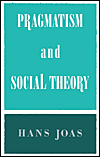
|
Joas,
Hans (1993). Pragmatism and Social Theory. Chicago: University
of Chicago Press.
Pragmatism and Social Theory is a collection of essays
focusing on pragmatism as a unifying framework that can link divergent
intellectual efforts to understand the social contexts of human
knowledge, individual freedom, and democratic culture. The book
explores the American social science tradition, its indebtedness
to the pragmatist thought, and the reception of this tradition in
Europe.
|
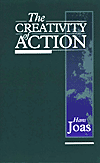
|
Joas,
H. (1992). The Creativity of Action. Cambridge: Polity
Press.
Taking philosophical pragmatism as its guide, the author outlines
a new theory of action which treats human activity as creative to
the core and not just in its implications. The Creativity of
Action addresses the nature of human intentions, intersubjectivity,
and the embodied character of human action, demonstrating the centrality
of classical pragmatism for contemporary social theory.
|

|
Kilpinen, Erkki (2000). The Enormous Fly-Wheel of Society. Pragmatism's Habitual Conception of Action and Social Theory. Hakapaino Oy: University of Helsinki.
This is a wide ranging exploration of “habit” as a central category of pragmatist philosophy and sociology. Drawing on the work of Peirce, James, Dewey, and Mead, the author examines the interplay between pragmatist theory and political practice of its founding figures. The discussion extends to contemporary sociologists, notably Talcott Parsons, whose perspective on social action is compared and contrasted to sociological theories informed by pragmatism.
|
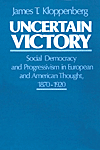
|
Kloppenberg,
James T. (1986). Uncertain Victory. Social Democracy and Progessivism
in European and American Thought, 1870-1920. New York: Oxford
University Press.
Between 1870 and 1920, two generations of European and American
intellectuals created a transatlantic community of philosophical
and political discourse. Uncertain Victory, a comparative
study of ideas and politics in the United States, Germany, France,
and Great Britain, demonstrates how a wide range of theorists and
activists laid the philosophical foundations for new programs of
social democracy informed by pragmatist philosophy.
|

|
Kloppenberg, James T. (2000). The Virtues of Liberalism. New York: Oxford University Press.
James Kloppenberg shows how the multifaceted virtues of liberalism have inspired theorists and reformers from Thomas Jefferson and James Madison through Jane Addams and John Dewey to Martin Luther King, Jr. and then explains how these virtues persist in the work of liberal democrats today. Endorsing the efforts of contemporary neo-progressive and communitarian theorists, the author defends liberalism from its conservative and radical critics.
|
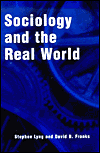
|
Lyng,
Stephen and David Franks. (2002). Sociology and the Real World.
Boulder, CO: Rowman & Littlefield.
Drawing on the transactional framework developed by Chicago pragmatists,
the authors reexamine contemporary sociological theory with an eye
to restoring respect for such concepts as objectivity, reality,
and truth. Sociology and the Real World reaffirms the interpretive
nature of human life while at the same time showing the profoundly
embodied character of human interactions, as it manifests itself
in the socially-conditioned brain circuitry and relational properties
of human emotions.
|
P

|
Margolis, Joseph (2002). Reinventing Pragmatism: American Philosophy at the End of the Twentieth Century. Cornell University Press.
Reinventing Pragmatism examines the force of the new pragmatisms, from the emergence of Rorty's and Putnam's basic disagreements of the 1970s until the turn of the century. Joseph Margolis considers the revival of a movement as both a surprise and a turn of great importance. The quarrel between Rorty and Putnam obliged American philosophers, and eventually Eurocentric philosophy as a whole, to reconsider American and European philosophy in terms of competing accounts of realism and naturalism.
|
p

|
Margolis, Joseph (1999). What, After All, Is a Work of Art?: Lectures in the Philosophy of Art. Pennsylvania State University Press.
The book starts with a review of prominent philosophies of art developed over the past half-century, and highlighting the need for carefully distinguishing between the metaphysical and epistemological features of physical nature and human culture. The second part of the book builds on the first part’s analyses of artworks to propose a theory of selves as "self-interpreting texts." The author’s main point is that our analysis of physical nature and our analysis of ourselves are mutually constitutive, and henceforth, should not be artificially separated.
|

|
Margolis, Joseph (2006). Introduction to Philosophical Problems. Continuum International Publishing Group.
Joseph Margolis introduces the reader to the central questions of Western philosophy. The book demonstrates not only how philosophical arguments progress but also how the most fundamental questions relate to each other. Addressing the non-specialist audience, the author deploys the philosophical intelligence inspired by pragmatism and makes clear in the process why it remains relevant for our times.
|

|
Menand, Louis (2001 ). The Metaphysical Club: A Story of Ideas in America. Farrar, Straus and Giroux.
The book follows the evolution of pragmatism as it emerged from the minds of four of the club's "members": Supreme Court Justice Oliver Wendell Holmes, William James, Charles Sanders Peirce and John Dewey. The Metaphysical Club describes how the lives of these great thinkers interconnect, places their work in their historical setting, and highlights their significance for our times.
|

|
Merrell, Flyod (1997). Peirce, Signs, and Meaning. University of Toronto Press.
Floyd Merrell juxtaposes Peirce's thought to that of early-twentieth-century philosophers such as Frege, Russell, and Quine, as well as contemporaries like Goodman, Putnam, Davidson, and Rorty. The book demonstrates how quests for meaning falls victim to vagueness in pursuit of generality, and how vagueness manifests an inevitable tinge of inconsistency, just as generalities always remain incomplete. Merrell also argues that the twentieth-century search for meaning has placed overbearing stress on language while ignoring nonlinguistic sign modes and means.
|

|
Nussbaum, Martha C. (2001). Upheavals of Thought: The Intelligence of Emotions. New York: Cambridge University Press.
In this extensive study, the author makes the case for emotions as central to ethical reasoning and conduct. The discussion starts with ancient Greek philosophy, and then focuses on the often frustrating efforts to carve out a place for emotions in philosophical inquiry. Blending studies from philosophy, anthropology, psychology, philology, musicology, and jurisprudence, the author lays out a theoretical framework designed to bring into one continuum reason, emotions, and conduct.
|

|
Nussbaum, Martha C. (2004). Hiding from Humanity: Disgust, Shame, and the Law. Princeton: Princeton University Press.
This is a study of disgust and shame and the far-reaching implications that primal emotions have for law, morality, and religion. The author cautions against public morality that seeks to harness the sense of repugnance for public good. To this stigmatization-based morality and legal practice, the author juxtaposes the liberal philosophy of John Stuart Mill who advocated a humane treatment of social outcasts.
|

|
Orril, Robert, ed. (1998). Education and Democracy: Re-imagining Liberal Learning in America. College Board.
This collection of essays explores the theory and practice of contemporary liberal education from the perspective of American pragmatism, with John Dewey's work serving as a general reference frame for the discussion. The result is a reimagined liberal education adapted to the needs of American democracy in the twenty-first century.
|

|
Pettegrew, John (2000). Pragmatism's Progress. Rowman & Littlefield Publishers, Inc.
A host of scholars examine Richard Rorty's influence on twentieth-century American pragmatism and its commitment to achieving social democracy. The volume includes James Kloppenberg's chapter "Pragmatism: The Old Name for Some New Ways of Thinking?", Joan Williams' article "Rorty, Radicalism, Romanticism: The Politics of the Gaze," Casey Nelson Blake's paper "Public Life and Private Commitments," John Pettegrew's chapter on "Life's of Irony: Randolph Bourne, Richard Rorty, & a New Genealogy of Critical Pragmatism," Barry Allen's chapter "Is It Pragmatism? Rorty and the American Tradition," and other authors, including Richard Rorty's response to critics.
|

|
Posner, Richard A. (2003). Law, Pragmatism, and Democracy. Cambridge, Massachusetts: Harvard University Press.
The author develops a pragmatist perspective on government, arguing that public representatives rely less on abstract reasons and rational deliberations than on interests and discretion in their decision making. According to the liberal perspective outlined in this volume, democracy is best understood as an ongoing struggle for power through elections where citizens choose among moral entrepreneurs competing for offices on the promise to deliver better times to the public unable and/or unwilling to work its way through intractable issues of day-to-day politics.
|

|
Posner, Richard A. (2003). Public Intellectuals: A Study of Decline. Cambridge, Massachusetts: Harvard University Press.
In this book, Richard Posner examines the changing role that public intellectuals have played in American society and politics. The discussion focuses on writers like Milton Friedman, Martha Nussbaum, Lani Guinier, Noam Chomsky, Gertrude Himmlefarb, and Stephen Jay Gould, and Andrea Dworkin, whose public stance is contrasted to that of George Orwell. The author expresses his concern about the declining quality of pubic discourse and suggests ways to improve it.
|

|
Posner, Richard A. (1990). Cardozo: A Study in Reputation. Chicago and London: The University of Chicago Press.
This is study of Benjamin Cardozo (1870-1938), a seminal legal scholar and U.S. Supreme Court Justice who left a mark on American jurisprudence through his acclaimed holdings, breadth of his scholarship, and graceful literary style. The author compares Cardozo with contemporary thinkers, including Oliver Wendell Holmes who developed kindred ideas in the spirit or American pragmatism.
|

|
Posner, Richard A. (2003). The Essential Holmes: Selections from the Letters, Speeches, Judicial Opinions, and Other Writings of Oliver Wendell Holmes, Jr. Edited and with an Introduction by Richard A. Posner. Chicago and London: The University of Chicago Press.
This is an anthology of letters, speeches, and holdings by one of the most prominent U.S. Supreme Court Justices, Oliver Wendell Holmes. The volume includes an extensive introduction by Richard Posner, a leading contemporary authority on pragmatist jurisprudence, who spells out why the legacy of Holmes remains relevant for out time.
|

|
Putnam, Hilary (1995). Pragmatism: An Open Question. Oxford: Blackwell Publishing, Inc.
In this book, Hilary Putnam confronts the teachings of James, Peirce, Dewey, and Wittgenstein –not solely out of an interest in theoretical questions, but above all to respond to the questions of whether it is possible to find an alternative to corrosive moral skepticism, on the one hand, and to moral authoritarianism on the other.
|

|
Putnam, Hilary (1999). Words and Life. Cambridge, Massachusetts: Harvard University Press.
The book sorts out what is obsolete and what is enduring in the ways philosophical problems have been posed over the course of time. While various supposedly timeless philosophical problems appear to be dated now, there is much of permanent value in the writings of Aristotle, Peirce, Dewey, and Reichenbach. A unifying theme of the volume is that reductionism, scientism, and old-style disenchanted naturalism tend to impede philosophical progress.
|
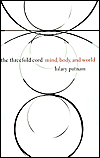
|
Putnam,
Hilary (1999). The Threefold Cord: Mind, Body and World. New
York: Columbia University Press.
Based on his Hilary
Putnam’s Dewey Lectures at Columbia University, and his Royce
Lectures given at Brown, this book offers a synthesis of Putnam’s
work developed over the course several decades and reflecting his
systematic effort to frame contemporary epistemology and philosophy
of mind in the pragmatist perspective. The Threefold Cord pays homage
to the later Wittgenstein, whose philosophical investigations reveal
an affinity to pragmatist thought.
|
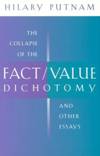
|
Putnam, Hilary (2004). The Collapse of the Fact/Value Dichotomy and Other Essays. Cambridge, Massachusetts: Harvard University Press.
In this book, Hilary Putnam acknowledges the usefulness of the fact/value distinction but denies that anything metaphysical follows from it. Taking a position that knowledge of facts presupposes knowledge of values, the author grounds his argument in Amartya Sen's discussions of non-self interested human motives and of "capabilities" people rationally value and enjoy freely exercising. The book focuses on imperative logic, the tension between economics and ethics, and preference theory.
|
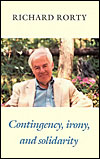
|
Rorty,
Richard. (1989). Contingency, Irony, and Solidarity. Minneapolis:
University of Minnesota Press.
Contingency, Irony, and Solidarity is a signature work of Richard
Rorty, a leading exponent of pragmatism in contemporary philosophy.
Drawing on Nietzsche, Freud, and Wittgenstein, the author argues
that a liberal society cannot be grounded in any metaphysical considerations
regarding human nature but must derive its strength from certain
attitudes fostered by great literature, such as non-cruelty, solidarity,
and the ironic sense of contingency.
|
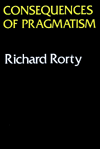
|
Rorty,
Richard (1982). Consequences of Pragmatism. Minneapolis: University
of Minnesota Press.
The Consequences of
Pragmatism, an early work of Richard Rorty, documents the evolution
of his thought from analytical philosophy toward pragmatism. The
author acknowledges his debt to John Dewey, whose anti-foundationalism
underlies Rorty’s epistemology and whose liberal sensibilities
inform Rorty’s perspective on democracy.
|

|
Rorty, Richard. (2000). Philosophy and Social Hope. Minneapolis: University of Minnesota Press. Penguin.
Since Plato philosophers have aimed at true reality hidden behind appearances. Against this tradition, Richard Rorty argues, pragmatism offers a new philosophy of hope. The book traces the evolution of Rorty’s thought from Plato towards William James and John Dewey, culminating in his own version of pragmatism. What ultimately matters, Rorty suggests, is not whether our ideas correspond to some fundamental reality but whether they help us carry out practical tasks and create a fairer and more democratic society.
|

|
Rorty, Richard and Eduardo Mendieta (2005). Take Care of Freedom And Truth Will Take Care of Itself: Interviews With Richard Rorty. Stanford University Press .
This volume collects interviews with Richard Rorty, spanning more than two decades of his public intellectual commentary, engagement, and criticism. In colloquial language, Rorty discusses the relevance and nonrelevance of philosophy to American political and public life. The collection also provides a candid set of insights into Rorty's political beliefs and his commitment to the labor and union traditions in this country.
|
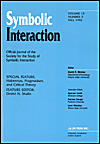
|
Habermas,
Pragmatism, and Critical Theory. Special Issue of Symbolic
Interaction. Edited by D. Shalin, 1992, Vol. 15.
The essays collected in this special journal issue examine the ingenuous
ways in which Jurgen Habermas appropriates American pragmatism in
his theory of communicative action. The authors are sympathetic
to Habermas’s attempt to develop reconstructive social theory
based on ideas of Mead, Dewey and Peirce, while at the same time
critical of the fact that he neglects the role of the body and emotion
in social interaction.
|

|
Self
in Crisis: Identity and Postmodern Condition. Special Issue
of Symbolic Interaction. Edited by D. Shalin, 1993, Vol. 16.
This special
journal issue on pragmatism and self-identity offers a critical
look at the postmodernist perspective on the human self. Having
examined the claim that the reality of human self must be questioned
in the media-driven world, the authors present the pragmatist alternative
to postmodernist thought. In particular, they argue that while self-identity
has grown increasingly fragmented in information-based societies,
it never lost its emotional substance and corporeal reality.
|
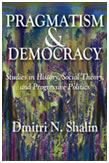
|
Shalin, Dmitri N. 2010. Pragmatism and Democracy: Studies in History, Social Theory and Progressive Politics. New Brunswick: Transactions Publishers.
This volume examines the roots of pragmatist imagination and traces the influence of American pragmatism in diverse areas of politics, law, sociology, political science, and transitional studies. Its central thesis is that democracy is an embodied process that binds affectively as well as rhetorically and that flourishes in places where civic discourse is an end in itself, a source of vitality and social creativity sustaining a democratic community. The author shows why civic discourse is hobbled by the civic body misshapen by past abuses. Drawing on the studies of the civilizing process, he focuses on the discourse, emotion, and body language of democracy and explores from this angle the prospects for democratic transformation in countries struggling to shake their totalitarian past.
|
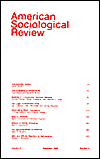
|
Shalin,
Dmitri. 1986. “Pragmatism and Social Interactionism.” American
Sociological Review 51:9-30.
The article explores the pragmatist roots of the interactionist tradition
in American sociology. Tracing its origins to the ideas of Peirce,
James, Dewey and Mead, the author shows how social interactionism
builds on the pragmatist notion that humans are participatory observers
in the drama of history continuously shaping their pluralistic universe.
The article draws parallels between the interactionist methodology
of participant observation and the nonclassical precepts of quantum
physics
|
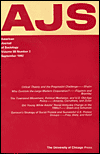
|
Shalin, Dmitri. 1988 “G. H. Mead, Socialism, and the Progressive Agenda.” American Journal of Sociology 92:913-951.
This paper examines Mead's political beliefs and his theory of the reform process. Drawing on little-known sources and archival materials, it demonstrates that Mead shared socialism's humanitarian ends and that, following the dominant progressive ideology of his time, he sought to accomplish these ends by constitutional means. An argument is made that Mead’s ideological commitments had profound effects on his substantive ideas, particularly on the dialectical premises of social interactionism.
|

|
Shalin,
Dmitri. 1992. “Critical Theory and the Pragmatist Challenge.” American Journal of Sociology 96:237-279.
This essay is an attempt to join issues with Jurgen Habermas, a leading
German scholar who made a concerted effort to bridge the gap between
American pragmatism and continental social thought. The author shares
with Habermas the view that social theory must be politically engaged
and reconstructive, but he argues that to meet the pragmatist challenge,
social theory must move beyond consensus building and appropriate
the productive properties of dissent, emotional intelligence, and
muddling through.
|

|
Shalin, Dmitri. 1993 “Modernity, Postmodernism, and Pragmatist Inquiry: An Introduction,” Symbolic Interaction 15:303-332.
This essay traces the similarities and differences between the pragmatist and postmodernist projects. It focuses on the contrasting perspectives on human selfhood, understood as a discursive fiction in the postmodernist theory and as an emotionally charged embodied phenomenon in pragmatism. An argument is made that symbolic interactionism is at the crossroads, that we may witness deepening divisions within the ranks of interactionist sociologists in years to come, and that each side in the emerging debate should make effort to learn from the other.
|

|
Shalin, Dmitri. 2000 “George Herbert Mead,” pp. 302-344 in The Blackwell Companion to Major Social Theorists, Introduced and edited by George Ritzer, Cambridge: Blackwell Publishers.
This essay explores the interfaces between Mead’s philosophical and sociological thought, his effort to combine academic pursuits with political engagement, and the impact his work has had on social theory. The discussion draws on Mead’s publications, as well as his unpublished papers and correspondence gathered in the Joseph Regenstein Library, University of Chicago. The focus is on Mead's principal contention that the individual and society are mutually constitutive, that mind is the subjective being of society while society is the objectified activity of mind.
|

|
Shalin, Dmitri. 2004. “Liberalism, Affect Control, and Emotionally Intelligent Democracy.” Journal of Human Rights 3:407-428.
After outlining the blueprint for democratic polity formulated in ancient Greece, this paper discusses the difficulties that fledgling democracies encounter on their way to civil society. An argument is made that civic discourse is inseparable from the civic body which has been misshapen by past abuses and which takes a long time to heal. In the final section, the author speculates about the emotion, demeanor, and the body language of democracy and explores from this angle the prospects for democratic transformation in countries that are struggling to shake their totalitarian past.
|

|
Shalin, Dmitri. 2005. “Legal Pragmatism, an Ideal Speech Situation, and the Fully Embodied Democratic Process.” Nevada Law Journal 5:433-478.
This paper is about jurists’ encounter with pragmatism and pragmatist philosophers’ grappling with law. It reviews the range of discursive and nondiscursive practices associated with the pragmatic perspective on jurisprudence,
shows the role that emotions play in legal practice, discusses Rawls's, Dworkin's, and Habermas's theory of law and democracy,
and appeals to the legacy of John Dewey and George Herbert Mead as theoreticians of a fully embodied democratic process.
|

|
Shook, John R. and Pauolo Ghiraldelli, eds. (2005). Contemporary Pragmatism. Rodopi.
This volume stems from a symposium on Richard Rorty and pragmatism and includes papers by Kai Nielsen on pragmatism as atheoreticism; Chandra Kumar on Foucault and Rorty; Chase Wrenn on pragmatism, Inquiry, and Truth; Christopher Voparil on the Idea
of Philosophy as Bildungsroman; Eugene Halton on
Peircean Animism and the End of Civilization, David Boersema on pragmatism and Poststructuralism, and other scholars.
|

|
Shusterman, Richard. (1992). Pragmatist Aesthetics. Living Beauty, Rethinking Art. Oxford: Blackwell Publishers.
Building on the insights of classical pragmatism, and especially John Dewey, the author develops an aesthetic theory for contemporary times. This theory treats aesthetic experience as a profoundly embodied phenomenon that informs both high and popular art. Pragmatist Aesthetics highlights the sociopolitical dimensions of art and aesthetic education and makes the case for ethics as an art of living.
|
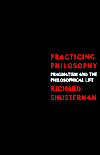
|
Shusterman, Richard. (1997). Practicing Philosophy. Pragmatism and Philosophical Life. Routledge: New York and London.
This book treats philosophy as a way of life and uses this approach to illuminate pragmatism’s richly complex contributions to questions of democracy and liberalism, theory and practice, rationality and aesthetics, ethnicity and embodiment. Practicing Philosophy also compares American pragmatists to European thinkers such as Foucault, Habermas, and Wittgenstein.
|

|
Shusterman, Richard. (2000). Performing Live: Aesthetic Alternatives to the Ends of Art. Cornell University Press.
Performing Live defends the power of aesthetic experience by exploring its diverse roles, methods, and meanings, especially in fields marginal to traditional aesthetics but now most vibrantly alive in today's culture and new media. Ranging from rap, techno, and country music to cinema, cyberspace and urban design, Richard Shusterman develops his radical theory of "somaesthetics," charting the complex network of bodily arts so prominent in contemporary life and self-styling. By blending concrete aesthetic analysis with insightful social critique, this well-known pragmatist philosopher provides a rich menu and critical guide for today's pursuit of the art of living.
|

|
Shusterman, Richard. (2002). Surface & Depth : Dialectics of Criticism and Culture. Cornell University Press.
Richard Shusterman explores the dialectics of surface and depth by examining key issues in the philosophy of art and culture – from the logic of interpretation and evaluation to the roots of taste and convention, from the meanings of aesthetic purity and immediacy to the role of nature, theory, and history in our experience and understanding of art. In treating these topics, Shusterman combines the methods of analytic philosophy, critical theory, and poststructualism to arrive at new positions, displaying the philosophical versatility, originality of vision, and graceful, accessible writing that have become his trademark.
|

|
Shusterman, Richard, ed. (2004). Range of Pragmatism and the Limits of Philosophy. Oxford: Blackwell Publishers.
The ten essays collected in this volume outline contemporary pragmatism in terms of its international impact, the diversity of its philosophical voices, and its pragmatic potential. The contributors appraise pragmatism's resources for treating crucial contemporary issues such as globalization, multiculturalism, race and ethnicity; problems of reconciling individual self-realization with democratic ideals of community; questions about the uses of law and education, and about the role of violence and the abiding scourge of war.
|

|
Simon, Linda ( 1999). Genuine Reality: A Life of William James. Chicago: University of Chicago Press.
This biography of William James covers the principal events and relationships in the life of this towering figure in pragmatist movement, including his early European travel; influential father; wife, siblings, and friends; mental breakdown and recovery; physical and emotional vulnerability; career indecision; role as teacher; and work in, and contributions to, psychology and philosophy.
|
p

|
West, Cornel (1998). The American Evasion of Philosophy: A Genealogy of Pragmatism. University of Wisconsin Press.
Taking Emerson as his starting point, Cornel West charts the emergence, development, decline, and recent resurgence of American pragmatism. John Dewey is the central figure in West’s analysis, but he treats as well such varied mid-century representatives of the tradition as Sidney Hook, C. Wright Mills, W. E. B. Du Bois, Reinhold Niebuhr, and Lionel Trilling. West’s "genealogy" is imbued with the author’s conviction that a thorough reexamination of American pragmatism may help inspire and instruct contemporary efforts to remake and reform American society and culture.
|
p

|
West, Cornell (2005). Democracy Matters: Winning the Fight Against Imperialism.
Following up on his earlier book Race Matters, Cornel West casts a critical look at the state of democracy in America , tracing the problems plaguing the country to a sense of nihilism in the corridors of power, the pervasive sentimentalism in the American mass media. Drawing on the works of Alexis de Tocqueville, Herman Melville, Ralph Waldo Emerson, Toni Morrison and others, the author calls for the renewal democratic institutions.
|
p

|
Westbrook, Robert (1993). John Dewey and American Democracy. Cornell University Press.
This is an intellectual biography of John Dewey as an advocate of participatory democracy and a democratic socialist who, in the 1920s and 1930s, questioned corporate capitalism's capacity to promote democratic values and championed the role of the school as a laboratory fostering cooperative impulses. The book draws attention to Dewey’s views on democratic experience and offers a blueprint for the revitalization of American democracy.
|
p

|
Westbrook, Robert (2005). Democratic Hope: Pragmatism and the Politics of Truth. Cornell University Press.
In Democratic Hope, Robert Westbrook examines the varieties of classical pragmatist thought in the work of John Dewey, William James, and Charles Peirce, testing in pragmatic fashion the truth of propositions by their consequences in experience. The discussion extends to contemporary pragmatists like Richard Rorty, Cheryl Misak, Richard Posner, Hilary Putnam, and Cornel West, and examines the pragmatist strains in contemporary American political thinking.
|

|
Wiley, Norbert. (1995). The Semiotic Self. Chicago: University of Chicago Press.
In this book, Norbert Wiley offers a new interpretation of the nature of the self in society. Drawing on his synthesis of the writings of Peirce, Mead, and others, Wiley argues that the self can be seen as an internal conversation, or a "trialogue" in which the present self ("I") talks to the future self ("you") about the past self ("me"). There is a mutually supportive relation between the self and democracy, which can be traced this through American history. In finding a way to decenter the self without eliminating it, Wiley supplies an alternative to current theories of postmodernism and a new direction to pragmatism.
|
p

|
Williams, Joan (2001). Unbending Gender: Why Family and Work Conflict and What to Do About It. Oxford University Press.
In treatise on gender, work, and domesticity, Williams offers a new vision of "family-friendly" feminism that would support women in all the various roles on the worker-caregiver continuum. With special attention to the diversity of women's experience in terms of race and social class, this book challenges common assumptions about gender roles and women's choices concerning work, family and career.
|
Society for the Advancement of American Philosophy
The Pragmatism Cybrary
Charles S. Pierce
William James
John Dewey
George Herbert Mead Project
Center for Dewey Studies
Helsinki Peirce Center and Metaphysical Club
Eugene Halton
Hans Joas
The Becker-Posner Blog
Dmirti Shalin
Richard Shusterman
Robert Westbrook
|
|